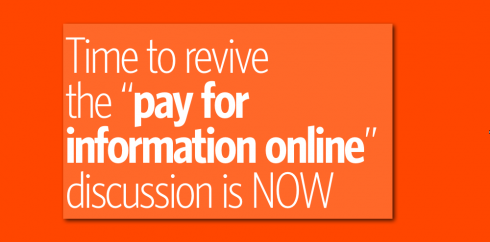
Updated Wednesday, Feb. 25, 2009: 3:20 a.m. EST
The news over the weekend that Journal Register Co., owner of the New Haven Register and 19 other daily newspapers, is filing for Chapter 11 crushed by the weight of corporate debt, is one more reason for us in this industry to consider what to now has been barely discussed and quickly abandoned: readers who want to access information provided by the newspaper should pay for it. We do it with music and pay 99 cents every time we download a song from iTunes; now with Amazon’s Kindle 2 many of us will be paying about $10 to download a book, and, if you hear Jeff Bezoz, CEO of Amazon.com, in interviews—-most recently with Today’s Matt Lauer-—he informs us that his new gadget will allow us to download as many as 1500 books and periodicals. Yes, newspapers subscriptions will be possible, too.
This is an opportune time for newspapers to revisit the issue of charging for the information they offer. So far, the model has worked for such publications as The Wall Street Journal, which has about one million paying sub scribers who value full access to the WSJ’s arsenal of iinformation. About 20 million people each month read articles made available free. The traffic that this generates is music to the ears of advertisers. True, not every newspaper has the exclusive and specific business content of the Journal. However, and this is a BIG however, the average regional newspaper offers something that nobody else can offer——the local news. Two of my existing clients at the moment, Sudkurier, in Lake Konstanz, Germany, and The Nation, of Nairobi, are newspapers with heavy production of daily zoned local supplements. The news they offer, covering every detail of life in sometimes rather small villages within their circulation area, IS NOT TO BE FOUND anyplace else.
Granted, a great part of what these newspapers carry daily is not what we would call vital information that someone may be willing to pay for. However, when it comes to how they cover their communities, not only is the BRAND a valuable source in terms of history, credibility and how readers relate to it, but also gives the local content a sense of exclusivity.
These are difficult, decisive times that require drastic changes in how we view what we do. I believe that the time is now better than ever to revive the discussion of paying for content. In many newsrooms the discussion has been limited to paying for an entire subscription to all contents; perhaps we need to follow the iTunes model——pay for what you want.
Some ideas to consider:
1. Every newsroom should REVIVE the discussion of payment for information provided in online editions.
2. Look for new angles which may involve the “unbundling” of the newspaper, so that one pays ONLY for what one wishes to read.
3. Push forward with positive momentum, thinking that the information that YOUR newspaper has is of value.
4. Readers today are aware that their newspaper, as they know it, may disappear totally. Nobody wants a community without a newspaper. Today the situation is different from what it was in 2000, for example, and readers may be more open to packages that will allow them to continue to receive the information they need and crave for, with reasonable payment.
5. Make it inexpensive, but not free.
I was happy to read a column in the Feb. 23 edition of The Wall Street Journal by L. Gordon Crovitz, former publisher of The Wall Street Journal, who agrees that newspapers need to act like they’re worth something.
It is past time for news companies to regain the courage to ask readers whether what they produce is worth paying for online. If it ‘s not, less news will be produced, and news companies and their journalists will have only themselves to blame.
More about why newspapers should charge for information online
Death to the free: Why recessions can be good
John Duncan writes about the price of information, and why newspaper managers need to start listening:
http://garciainteractive.com/blog/view/29/
The lost art of planning?
Mario Garcia Jr. discusses the importance of planning. Go here:
http://garciainteractive.com/blog/view/32/
:
To read TheRodrigoFino blog, in Spanish, go:
https://garciamedia.com/latinamerica/blog/
Today, Rodrigo Fino writes about what is possible online, and how videos and other multimedia allow one to revisit the past and take a shot at the future.
[+] If Advertising Ages Says it……

[+] It’s Not Newspapers in Peril; It’s Their Owners
NEW YORK (AdAge.com)—For all the apocalyptic news about newspapers, there’s a distinction worth making: Newspaper owners are far more endangered than the medium itself.
TheMarioBlog posting #200